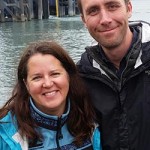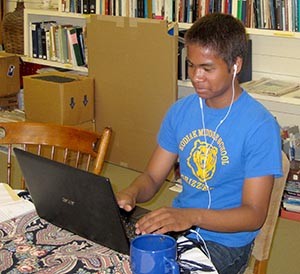By Lisa Matlock
Outreach Coordinator

Many of the council’s volunteers and staff experienced 1989’s Exxon Valdez oil spill firsthand. Memories of the smell, the terrible sights and sounds, and the social and environmental impacts on communities drive our volunteers to keep such a thing from happening again.
For today’s youth, who will someday join the board to represent communities impacted by that spill, the need to be vigilant and resist complacency can seem vague and somewhat disconnected to their daily reality.
A recent focus of the council on oral history of the oil spill and our creation as an organization, is helping fill this gap.
History of the spill and the council
Oral histories of the Exxon Valdez oil spill, gathered through written interviews and audio and video recordings, summarize many different perspectives on the spill and its aftermath. These are available to the public in different formats.
The first of these, “The Spill: Personal Stories from the Exxon Valdez Disaster,” co-edited by former staff member Stan Jones, was released to commemorate the 20th anniversary of the oil spill in 2009. In 2014, for the 25th anniversary, audio recordings of the interviews conducted during research for “The Spill”, as well as some new video interviews, were archived as part of the University of Alaska Fairbanks’ Project Jukebox, an online repository of oral histories about Alaska. The council partnered with the university and the Alaska Library Association to archive and share these stories of those who experienced the oil spill firsthand.
Most recently, oral history interviews of the founding members of the council have been released in a booklet called “Stories of a citizen’s council: Personal reflections of the early years of the Prince William Sound Regional Citizens’ Advisory Council.” The booklet is a collection of stories about the formation and early development of the council, and the hopes and intentions of some who were closely involved with early days of the council.
Why are we documenting this history?
These oral histories are helping us train and educate new staff, volunteers, and citizens all over the Exxon Valdez oil spill region, as part of the council’s efforts to involve youth in our mission.
One such effort, Alaska Geographic’s sea kayaking expeditions, used “The Spill” during activities to get teachers and youth thinking about what the spill did while they were immersed in Prince William Sound (read more on page 2).

College classes are using “The Spill” in field courses as part of the official syllabi to learn about effects of oil spills on the environment and communities.
Project Jukebox is being used by youth involved with the Copper River Watershed Project’s stewardship program (read more on page 1).
Audio oral history is also part of a “West Side Stories” project at the Baranov Museum in Kodiak. An environmental journalism intern is transcribing resident’s stories, gathered this summer, about the effects of the Exxon Valdez spill on the west side of Kodiak Island. This intern is also developing radio spots from these audio recordings.
The past informs the future
To move forward with our work, the council needs to know where we have been, before we can understand where we need to go. Oral history also helps us understand just how far we’ve come. Our shared history is an ever-present reminder of the need to stay vigilant. Complacency can set in unless the words of those who felt the damage firsthand are heard.